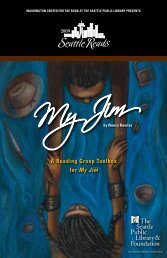Download - Seattle Public Library
Download - Seattle Public Library
Download - Seattle Public Library
You also want an ePaper? Increase the reach of your titles
YUMPU automatically turns print PDFs into web optimized ePapers that Google loves.
Jhumpa Lahiri’s critically acclaimed first novel, The Namesake, illuminates her<br />
signature themes, first explored in her Pulitzer Prize-winning collection of short<br />
stories, Interpreter of Maladies: the immigrant experience, the clash of cultures, the<br />
tangled ties between generations.<br />
The Namesake takes the Ganguli family from their tradition-bound life in Calcutta<br />
through their fraught transformation into Americans. On the heels of an arranged<br />
marriage, Ashoke and Ashima Ganguli settle in Cambridge, Massachusetts, where<br />
Ashoke does his best to adapt while his wife pines for home. When their son, Gogol,<br />
is born, the task of naming him betrays the vexed results of bringing old ways to the<br />
new world.<br />
Named for a Russian writer, and left with his pet name rather than a proper<br />
Bengali first name, Gogol Ganguli knows only that he suffers the burden of his<br />
heritage as well as his odd, antic name. He stumbles along the second-generation<br />
path, strewn with conflicting loyalties, comic detours, and wrenching love affairs.<br />
Edited from material provided by Houghton Mifflin Company<br />
About the Author<br />
Jhumpa Lahiri was born in London in 1967, the daughter of Bengali parents<br />
who emigrated from India, and was raised in Rhode Island. Lahiri learned about her<br />
Bengali heritage at an early age, traveling regularly to Kolkata (Calcutta), spending<br />
considerable time with her extended family. Lahiri is a graduate of Barnard College,<br />
where she received a B.A. in English literature, and of Boston University, where she<br />
received an M.A. in English, M.A. in creative writing, M.A. in comparative literature<br />
and the arts, and Ph.D. in Renaissance studies.<br />
Lahiri’s debut collection of stories, Interpreter of Maladies, was published in<br />
1999, to critical acclaim. Among its numerous awards were the 2000 Pulitzer Prize<br />
for fiction, the PEN/Hemingway Award, and The New Yorker Best Debut of the Year<br />
Award. It was translated into 29 languages and became an international bestseller. The<br />
New Yorker named Lahiri one of the 20 best young writers in America. The Namesake<br />
was published in 2003 and was named a best book of the year by the New York Times,<br />
USA Today, Entertainment Weekly, and Newsday. It has been made into a feature film,<br />
directed by Mira Nair, opening in theaters in March 2007.<br />
Lahiri lives in Brooklyn with her husband and two children. Like her character,<br />
Gogol, her pet name inadvertently became her public name. The name given to her at<br />
birth was Nilanjana Sudeshna.When she was enrolled in school, her teachers decided<br />
that Jhumpa was the easiest of her names to pronounce and “that was that.”<br />
A Conversation with Jhumpa Lahiri<br />
“Interpreter of the Second Generation”<br />
Pulitzer-winner Jhumpa Lahiri talks about being “between the cracks of two cultures,” her<br />
wedding in Kolkata, and ideas that shaped her new book.<br />
Sandip Roy-Chowdhury. Nov. 03, 2003<br />
On a sticky August evening two weeks before her due date, Ashima Ganguli<br />
stands in the kitchen of a Central Square apartment, combining Rice Krispies and<br />
Planters peanuts and chopped red onion in a bowl. She adds salt, lemon juice, thin<br />
slices of green chili pepper, wishing she had mustard oil to pour into the mix.<br />
The year is 1968 and it’s hard to make a satisfying jhaal muri in an apartment in<br />
Massachusetts, no matter if it’s the one thing you crave in your pregnancy. Reading<br />
the exceptional detail in her first full-length novel, The Namesake, it’s easy to forget<br />
that Jhumpa Lahiri probably doesn’t remember much of Bengali life in Boston or<br />
Cambridge in the late 1960s. She was born in 1967 in London and moved with her<br />
parents to the United States soon after. Unlike the Amy Tans and Chitra Divakarunis<br />
and Bharati Mukherjees with whom she is often compared, Lahiri is very much the<br />
“second-generation” writer. That’s why, though The Namesake starts with Ashima in<br />
her kitchen in Central Square, its real protagonist is the son she is pregnant with<br />
– Gogol. Lahiri was in San Francisco recently talking about Gogol, the Pulitzer, and<br />
the sounds of Bengali.<br />
After winning the Pulitzer for your first collection of short stories Interpreter of<br />
Maladies, everyone has been waiting to see if you could live up to that promise<br />
and write a full-length novel. Does The Namesake feel a bit like the child star’s<br />
first movie as an adult?<br />
I tried not to think about what other people were going to think about my next<br />
book. I had already started the book when I got the Pulitzer and just stuck to the<br />
path. I knew I couldn’t live up to any expectation that once you write a successful<br />
book the next one has to be as successful or more successful. As a writer I just want<br />
to grow and learn from each book.<br />
Do you remember the moment you heard you had won the Pulitzer?<br />
Yes, I was in my apartment. We had just come back from a short trip to Boston<br />
and I was heating up some soup for my lunch. My suitcases were still not unpacked.<br />
And the phone rang. It was one or two in the afternoon. The person who called me
















